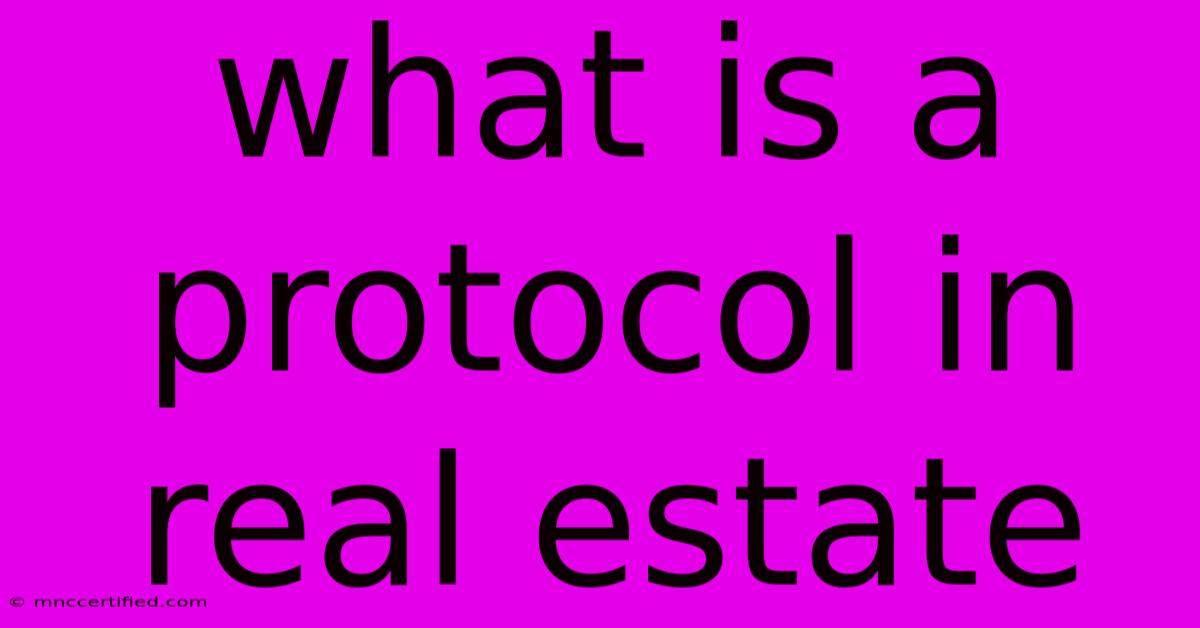What Is A Protocol In Real Estate

Table of Contents
What is a Protocol in Real Estate? A Comprehensive Guide
In the dynamic world of real estate, navigating the complexities of transactions requires a clear understanding of procedures and guidelines. A "protocol" in this context refers to a formalized set of rules, procedures, and standards that govern various aspects of real estate dealings. These protocols aren't legally binding in the same way as laws, but they are essential for maintaining efficiency, transparency, and ethical conduct throughout the buying, selling, or leasing process. Understanding these protocols is crucial for both real estate professionals and clients to ensure smooth and successful transactions.
Key Protocols in Real Estate Transactions
Real estate protocols cover a broad spectrum of activities, varying based on location, transaction type (residential, commercial, etc.), and individual company policies. However, several common protocols consistently emerge:
1. Communication Protocols: Maintaining Clear and Timely Interactions
Effective communication forms the backbone of any successful real estate deal. Protocols surrounding communication usually emphasize:
- Prompt Responses: Agents are expected to respond to client inquiries and other professionals within a reasonable timeframe, typically within 24-48 hours. This protocol ensures everyone stays informed and prevents delays.
- Detailed Documentation: Maintaining detailed records of all communications, including emails, phone calls, and text messages, is crucial. This documentation serves as a valuable resource in case of disputes and ensures accountability.
- Professional Conduct: Maintaining a professional and respectful tone in all communications is essential. This includes avoiding slang, discriminatory language, and unprofessional behavior.
2. Showing Properties: Protocols for Access and Safety
Protocols surrounding property showings are designed to protect both the property and those accessing it. Common protocols include:
- Appointment Scheduling: Showings are typically scheduled in advance to ensure the property owner's privacy and availability.
- Agent Supervision: Agents are responsible for supervising showings and ensuring the property remains secure.
- Safety Precautions: Agents might be required to follow specific safety protocols, such as locking doors and windows after showings and reporting any suspicious activity.
3. Offer and Negotiation Protocols: Structuring and Managing Offers
The offer and negotiation phase is often where many protocols come into play, focusing on:
- Written Offers: Offers are typically submitted in writing to ensure clarity and prevent misunderstandings.
- Disclosure Requirements: Agents are responsible for disclosing all relevant information about the property to potential buyers, including any known defects or issues.
- Negotiation Strategies: While specific negotiation strategies vary, ethical protocols emphasize fairness, transparency, and good faith negotiations.
4. Due Diligence Protocols: Thorough Investigation Before Closing
Before a transaction closes, both parties conduct thorough due diligence. Protocols here focus on:
- Property Inspections: Buyers usually conduct inspections to identify any potential problems with the property.
- Title Search: A title search ensures the seller has clear ownership of the property.
- Financing Verification: Buyers must verify their financing is in place before closing.
5. Closing Protocols: Finalizing the Transaction
The closing process involves numerous protocols to ensure a smooth and legal transfer of ownership. These often involve:
- Document Preparation: All necessary documents, including contracts, deeds, and financing agreements, must be prepared correctly.
- Funds Transfer: The transfer of funds from buyer to seller must be handled securely and according to legal guidelines.
- Record Keeping: Accurate record-keeping is critical for both parties, ensuring compliance with regulations and facilitating future reference.
Why are Real Estate Protocols Important?
Adhering to established protocols offers several key benefits:
- Minimizes Risk: By following standardized procedures, parties involved reduce the risk of disputes, misunderstandings, and legal challenges.
- Enhances Efficiency: Clear protocols streamline the transaction process, making it faster and more efficient for everyone involved.
- Promotes Transparency: Open communication and documented procedures increase transparency, building trust between buyers, sellers, and agents.
- Protects All Parties: Protocols protect the interests of all parties involved, ensuring fairness and accountability throughout the process.
- Maintains Professionalism: Adherence to protocols upholds professional standards within the real estate industry.
By understanding and applying the relevant protocols, both real estate professionals and clients can navigate the complexities of real estate transactions with greater confidence and achieve successful outcomes. Remember that these protocols often supplement, but don't replace, local laws and regulations. Always consult with legal and real estate professionals for guidance specific to your circumstances.

Thank you for visiting our website wich cover about What Is A Protocol In Real Estate. We hope the information provided has been useful to you. Feel free to contact us if you have any questions or need further assistance. See you next time and dont miss to bookmark.
Featured Posts
-
Kendrick Lamars Gnx Surprise Album Drop
Nov 23, 2024
-
Chester Citys Lantern Parade
Nov 23, 2024
-
Loeffler Reported For Usda Post
Nov 23, 2024
-
Luke Evans Sparks Fury On Saturday Kitchen
Nov 23, 2024
-
Margaret Bonds Montgomery Pdf Music
Nov 23, 2024